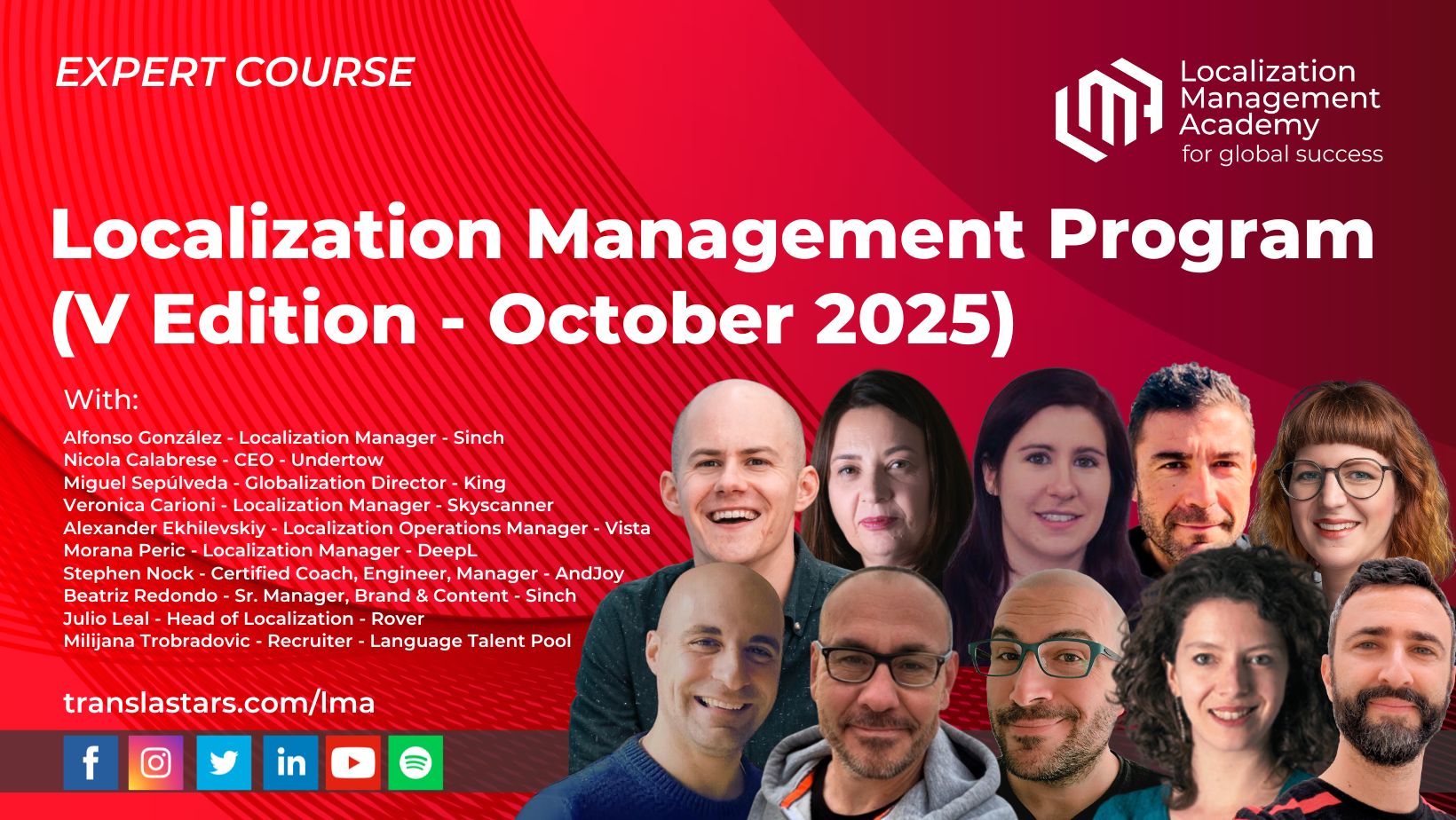As businesses expand into global markets, the demand for skilled localization professionals is on the rise. Localization goes beyond simple translation, it's about adapting content, products, and services to meet the cultural and linguistic expectations of different regions. This dynamic field offers a wide range of career opportunities for those with the right blend of language skills, cultural insight, and technical expertise.
In this article, we’ll explore the 10 most in-demand jobs in localization and the essential skills you’ll need to succeed in each role. A special thanks to Milijana Trobradovic, one of our specialized tutors of the Localization Management Program and Master in AI & Innovation for Localization, for providing her personal insights about the topic.
Let’s begin!
In this article, we’ll explore the 10 most in-demand jobs in localization and the essential skills you’ll need to succeed in each role. A special thanks to Milijana Trobradovic, one of our specialized tutors of the Localization Management Program and Master in AI & Innovation for Localization, for providing her personal insights about the topic.
Let’s begin!
1. Localization Manager
The Localization Manager oversees the end-to-end process of adapting content, products, or services for international markets. They coordinate cross-functional teams, manage timelines and budgets, and ensure linguistic and cultural accuracy across all localized materials.
This role requires strong project management skills, a deep understanding of localization workflows, and the ability to work with both internal stakeholders and external vendors.
This role requires strong project management skills, a deep understanding of localization workflows, and the ability to work with both internal stakeholders and external vendors.
Main Skills required:
2. Localization Engineer
The Localization Engineer is responsible for preparing digital content and software for localization and translation.
They create and manage localization workflows, extract and re-integrate translatable content, and troubleshoot technical issues in file formats, code, and tools. Their work ensures that localized products function correctly across languages and platforms.
They create and manage localization workflows, extract and re-integrate translatable content, and troubleshoot technical issues in file formats, code, and tools. Their work ensures that localized products function correctly across languages and platforms.
Main Skills required:
3. AI Localization Specialist
The AI Localization Specialist adapts AI-powered products, such as chatbots, virtual assistants, and generative AI models, for global markets. They ensure that AI systems understand and generate culturally and linguistically appropriate content across different locales.
This role blends linguistic expertise with a strong grasp of machine learning, natural language processing (NLP), and data annotation.
Talking of NLP, did you know that on our website, you can find a dedicated course? It is called “NLP - Natural Language Processing Essentials for Language Professionals”, hosted by our expert Francesco Saina.
Participants gain fresh insights into how language experts and technology interact while building foundational knowledge in the key areas that are shaping the current AI-driven transformation of the language industry.
This role blends linguistic expertise with a strong grasp of machine learning, natural language processing (NLP), and data annotation.
Talking of NLP, did you know that on our website, you can find a dedicated course? It is called “NLP - Natural Language Processing Essentials for Language Professionals”, hosted by our expert Francesco Saina.
Participants gain fresh insights into how language experts and technology interact while building foundational knowledge in the key areas that are shaping the current AI-driven transformation of the language industry.

Main Skills required:
4. Localization Project Manager
The Localization Project Manager is responsible for planning, executing, and delivering localization projects on time and within budget.
They serve as the main point of contact between clients, translators, engineers, and other stakeholders, ensuring clear communication and smooth workflows. Their goal is to keep projects organized while maintaining high linguistic and technical quality across all deliverables.
If you want to become a pro as a localization manager, don’t miss the chance to join our V edition of the Localization Management Program, starting next October.
Acquire the skills from the best localization managers to establish a localization strategy and know how to implement it anywhere.
They serve as the main point of contact between clients, translators, engineers, and other stakeholders, ensuring clear communication and smooth workflows. Their goal is to keep projects organized while maintaining high linguistic and technical quality across all deliverables.
If you want to become a pro as a localization manager, don’t miss the chance to join our V edition of the Localization Management Program, starting next October.
Acquire the skills from the best localization managers to establish a localization strategy and know how to implement it anywhere.

Main Skills required:
5. Content Localization Manager
The Content Localization Manager focuses on adapting marketing, editorial, and product content for global audiences while preserving brand voice and intent.
They work closely with content creators, linguists, and regional teams to ensure that messaging resonates culturally and linguistically across markets. This role requires a strategic mindset, linguistic sensitivity, and a strong grasp of content strategy.
They work closely with content creators, linguists, and regional teams to ensure that messaging resonates culturally and linguistically across markets. This role requires a strategic mindset, linguistic sensitivity, and a strong grasp of content strategy.
Main Skills required:

6. Localization Specialist
The Localization Specialist adapts content, UI elements, and documentation to meet the linguistic, cultural, and usability expectations of global audiences. Beyond translation, they collaborate with design and product teams to ensure that localized content fits seamlessly into user interfaces, maintains functional integrity, and delivers a consistent user experience across languages.
This role is a hybrid of linguistic precision and user-focused thinking. Not by chance, the Localization Specialist must ensure that the User Experience is preserved throughout different cultures and languages, especially where content and interface elements are tightly integrated.
At TranslaStars, we've got you covered. Our expert and UX Localizer, Bruna Beatriz Gabriel, is waiting for you to join her expert course on “UX and Localization”.
Learn the fundamentals, the several tools and strategies involved, and how variables, tags, and elements found in strings should be tackled to ensure the quality of experiences rebuilt in another language.
This role is a hybrid of linguistic precision and user-focused thinking. Not by chance, the Localization Specialist must ensure that the User Experience is preserved throughout different cultures and languages, especially where content and interface elements are tightly integrated.
At TranslaStars, we've got you covered. Our expert and UX Localizer, Bruna Beatriz Gabriel, is waiting for you to join her expert course on “UX and Localization”.
Learn the fundamentals, the several tools and strategies involved, and how variables, tags, and elements found in strings should be tackled to ensure the quality of experiences rebuilt in another language.
Main Skills required:
7. Multimedia Localization Specialist
The Multimedia Localization Specialist handles the adaptation of audiovisual content, such as videos, e-learning modules, voiceovers, and subtitles, for global audiences.
This role involves syncing text and speech, managing timing and visual consistency, and ensuring cultural and linguistic accuracy across media formats. They work closely with designers, video editors, and linguists to localize multimedia content without compromising user experience or brand impact.
Suppose you want to dive deeper into the subtitling field. In that case, we can give you the chance to discover the true potential of subtitles, which can enhance viewer engagement, accessibility, and content retention. Go check our expert course “Subtitling 360°: From Beginner to Pro” by Maria Virgínia Barros.
This role involves syncing text and speech, managing timing and visual consistency, and ensuring cultural and linguistic accuracy across media formats. They work closely with designers, video editors, and linguists to localize multimedia content without compromising user experience or brand impact.
Suppose you want to dive deeper into the subtitling field. In that case, we can give you the chance to discover the true potential of subtitles, which can enhance viewer engagement, accessibility, and content retention. Go check our expert course “Subtitling 360°: From Beginner to Pro” by Maria Virgínia Barros.
Main Skills required:
8. Localization Quality Assurance Specialist
The LQA Specialist ensures that localized content meets quality standards across languages, platforms, and formats. They review translations in context, check for linguistic accuracy, formatting consistency, functional issues, and cultural appropriateness.
This role often involves testing localized software, websites, or apps to catch bugs or errors before release, playing a critical part in delivering a polished user experience.
This role often involves testing localized software, websites, or apps to catch bugs or errors before release, playing a critical part in delivering a polished user experience.
Main Skills required:
9. Business Development Manager
The Business Development Manager in localization is responsible for identifying and securing new clients, growing strategic partnerships, and expanding the company’s market presence. They understand client localization needs and craft tailored solutions that align with business goals.
This role is metrics-driven, with clear KPIs tied to sales pipeline, closed deals, client retention, and market expansion. Speaking of KPIs, do you want to learn how to measure the impact of your localization projects and optimize your localization strategy?
In the “KPI Measurement for Localization Managers” course, hosted by our CEO, Alfonso González Bartolessis, you will discover the key performance indicators that are relevant for localization managers, how to collect and analyze them, and how to use them to improve your localization processes and outcomes.
This role is metrics-driven, with clear KPIs tied to sales pipeline, closed deals, client retention, and market expansion. Speaking of KPIs, do you want to learn how to measure the impact of your localization projects and optimize your localization strategy?
In the “KPI Measurement for Localization Managers” course, hosted by our CEO, Alfonso González Bartolessis, you will discover the key performance indicators that are relevant for localization managers, how to collect and analyze them, and how to use them to improve your localization processes and outcomes.
Main Skills required:
10. SEO Localization Expert
The SEO Localization Expert ensures that digital content is optimized for search visibility in target markets. They adapt keywords, metadata, and on-page SEO elements, not just through direct translation, but with a deep understanding of local search behaviour, language nuances, and regional search engine algorithms.
Their work helps brands maintain high rankings, increase organic traffic, and reach the right audiences in every locale.
Learn how to master the SEO art with our “Comprehensive SEO Course: From Zero to SEO Hero”, from our SEO Expert and Localization Specialist, Maja Walczak. This course combines all the resources, tools, and practical knowledge that Maja gained over the years.
Their work helps brands maintain high rankings, increase organic traffic, and reach the right audiences in every locale.
Learn how to master the SEO art with our “Comprehensive SEO Course: From Zero to SEO Hero”, from our SEO Expert and Localization Specialist, Maja Walczak. This course combines all the resources, tools, and practical knowledge that Maja gained over the years.
Main Skills required:
Conclusion
As the demand for global content and user experiences continues to grow, the localization industry offers a wide range of exciting and essential roles. From technical experts like Localization Engineers to strategic thinkers like Business Development Managers, each role plays a crucial part in making products and content accessible, engaging, and culturally relevant across markets.
By understanding the skills required for these in-demand jobs and staying ahead of AI advancements, professionals can better position themselves for success in a rapidly evolving global landscape, and organizations can build stronger, more effective localization teams to support their international growth.
By understanding the skills required for these in-demand jobs and staying ahead of AI advancements, professionals can better position themselves for success in a rapidly evolving global landscape, and organizations can build stronger, more effective localization teams to support their international growth.
Last, but not least, don’t miss our upcoming Master in AI & Innovation for Localization coming up in September. This live online program is designed to equip language professionals with cutting-edge AI tools and techniques to enhance their localization, translation, and content creation skills. Over three months, participants will engage in live online sessions, practical workshops, and collaborative projects to deepen their understanding of AI applications in the localization industry.
If you liked this article, read also:





